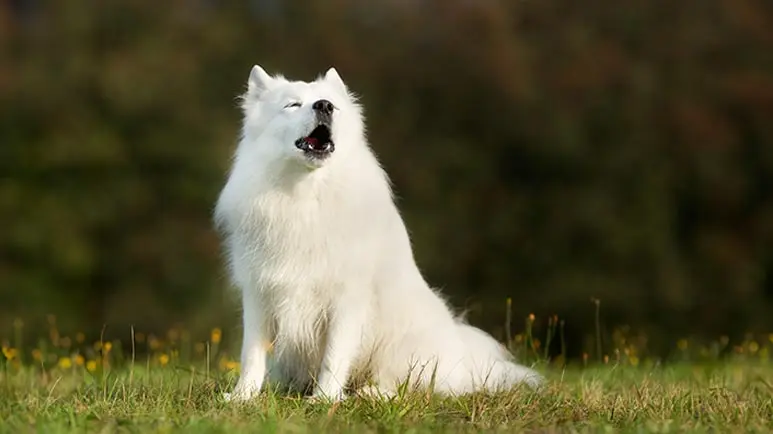Why Can't Your Dog Resist Howling?
Have you ever wondered why some dogs howl more than others? Uncover the surprising reasons behind this behavior and its connection to wolves.

STORY AT-A-GLANCE
- A study by researchers at Eötvös Loránd University in Hungary looked at how different domestic dog breeds respond to the howls of wolves
- They discovered that so-called ancient breeds are more likely to howl in response to recordings of wolf howls, whereas “modern breeds” are more apt to bark instead
- Dogs who howled in response to wolf howls showed stress-related behaviors such as mouth licking, urinating, or shaking
- Neutered male dogs howled more often in response to wolf howls than intact males
Researchers in the Department of Ethology at Eötvös Loránd University in Hungary (ELTE) set out to answer some questions about how domesticated dogs react to wolf howls. Are some breeds more likely than others to reply with howling, and if so, are they genetically closer to wolves?
Results of their fascinating study were published recently in the journal Communications Biology.1
Some Dogs (but Only Some) Howl in Response to Wolves
Among members of the wild canine crowd, in this case wolves, howling is a widespread form of communication. They use it to talk long distance with others, to mark territorial boundaries, and to determine the location of other wolves who reply to them with howling.
However, when it comes to our canine companions, the howling thing gets a bit more complicated. Example: wolf-like sled dogs are considered “hard howlers,” meaning they do it a lot, often for no real reason, such as in response to sirens, bells, or music. However, other sled dogs virtually never howl, even though they can.2
The ELTE research team measured the genetic similarity to wolves (aka “root distance”) of 68 purebred pet dogs by playing recordings of wolf howls and observing their reactions. The experiments took place in a behavioral laboratory, and the results showed that ancient breeds (breeds genetically more similar to wolves) were more likely to reply to the recordings with their own howls.
Breeds more distantly related to wolves (“modern breeds”) typically reacted with barking instead of howls. According to Fanni Lehoczki, lead study author, while most breeds have the ability to howl, the behavior seems to have lost its functionality somewhere along the line due to the changed social environment.
The researchers believe this could also suggest that ancient breeds are responding to the howls by trying to communicate with the wolves, whereas modern breeds are trying to communicate with their owners instead.
Dingoes, a canine species that took an evolutionary path away from domestic dogs around 8,000 years ago, are known to howl extensively to find each other, just like wolves.
Dogs Who ‘Howl Back’ at Wolves Show Signs of Stress
According to Tamás Faragó, postdoctoral researcher and senior author of the study:
“Additionally, we found that breeds which howl more also show more stress-related behaviors [mouth licking, urinating, or shaking] in this situation. We assume that more ancient breeds, which are genetically closer to wolves, can process the information encoded in wolf howls better than modern breeds. Thus, ancient breeds of our study might become stressed by intruding on a pack’s territory and use howling for the sake of avoidance, just as wolves do.”3
Young dogs, no matter the breed, responded with some form of howling upon hearing wolf howls, suggesting that most dogs of all breeds are capable of howling. But the more closely related an adult dog was to a wolf, the more likely they were to howl back in response to a wolf wail. Faragó continues:
“Interestingly, this genetic effect on howling occurs only among older dogs (>5 years), for which an experience- or some age-related personality effect can be a plausible explanation. It is possible that- in line with our hypothesis, that howling appearing with a higher level of stress is a fear reaction — older dogs are more fearful, which was already suggested by previous studies, but these speculations require further investigation.”
Neutered Males Howled More Often Than Intact Males
In addition to the dogs’ breeds and ages, the effect of other features like sex and reproductive status were also tested by the ELTE team.
“What we found is that something is going on with the male sex hormones, as there is no difference between intact and spayed females, but intact and neutered males do behave differently,” Lehoczki explains.
“Neutered males, which [lack] testosterone, howl more in response to the [recordings]. As neutered males are suggested to be more fearful, this result can be in line with our findings about responsiveness and more stressed behavior. Thus, the dog howl may mean ‘I am scared, don't come closer.’”
This suggests environmental and social factors could still play a larger role in determining canine vocal behavior than genetics, explains Lehoczki and team. This is the first study to specifically investigate howling in domestic dogs in response to wolf howls. The findings support the hypothesis that domestication and selective breeding by humans fundamentally changed dogs’ vocal repertoire and both the perception and production of howling in dogs.











